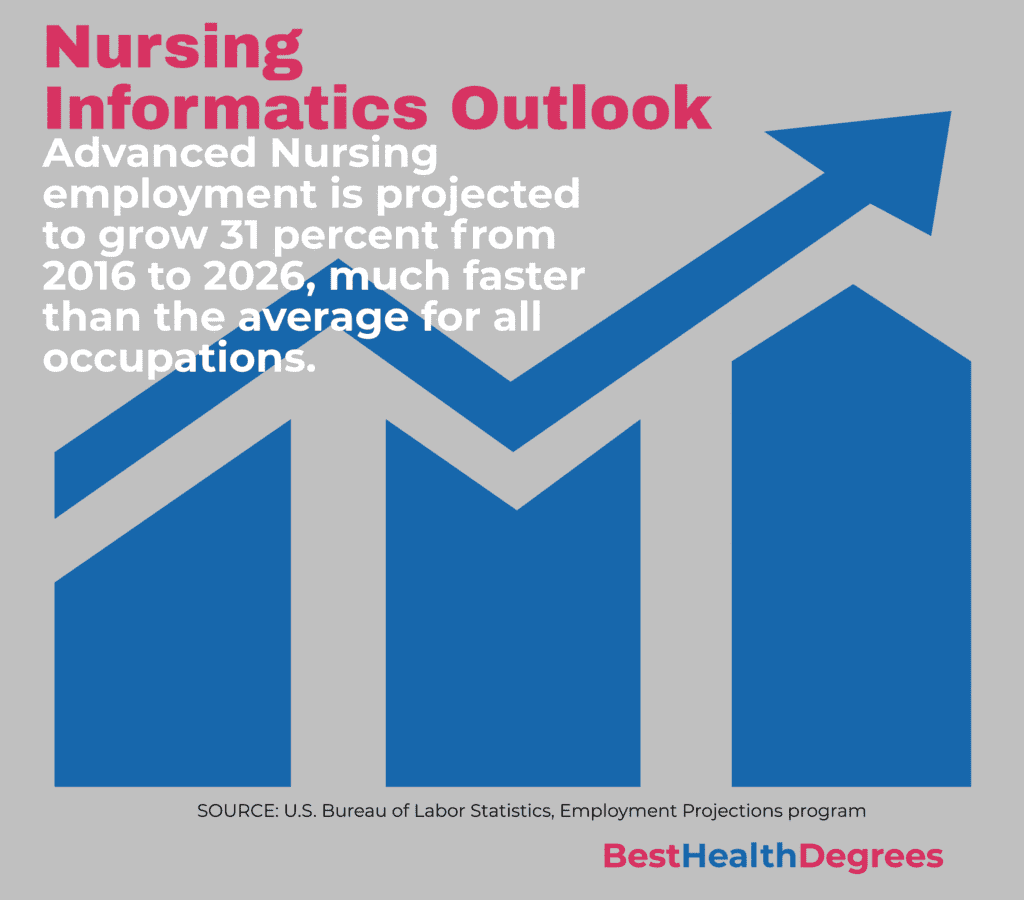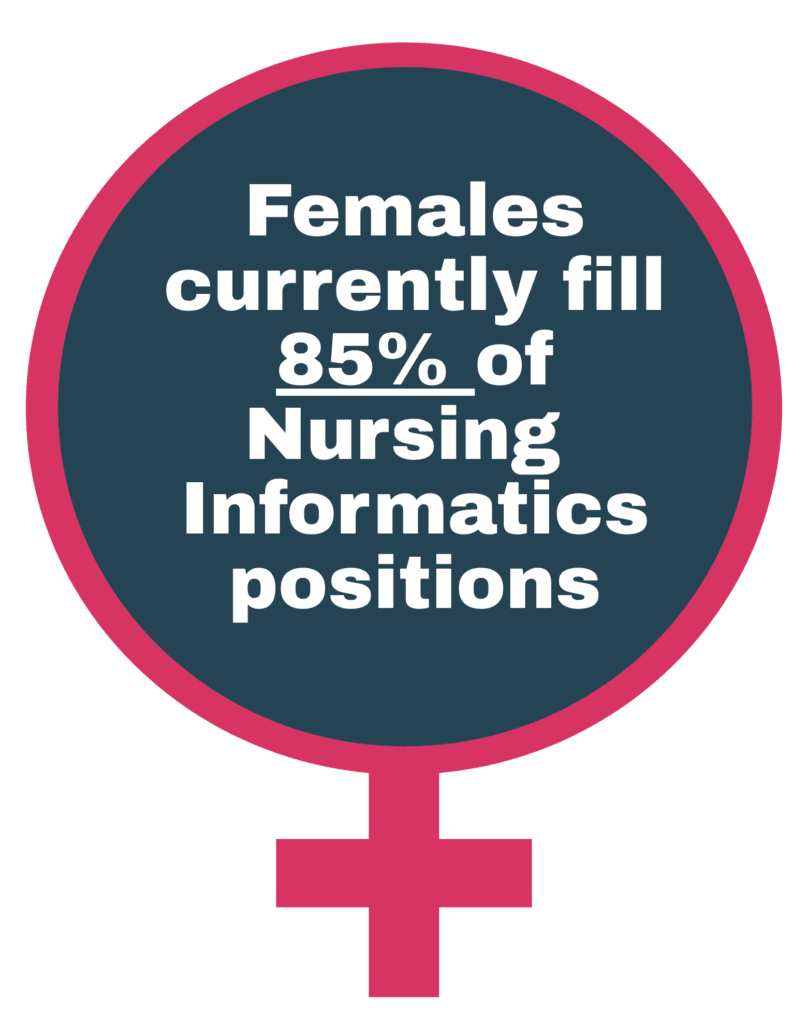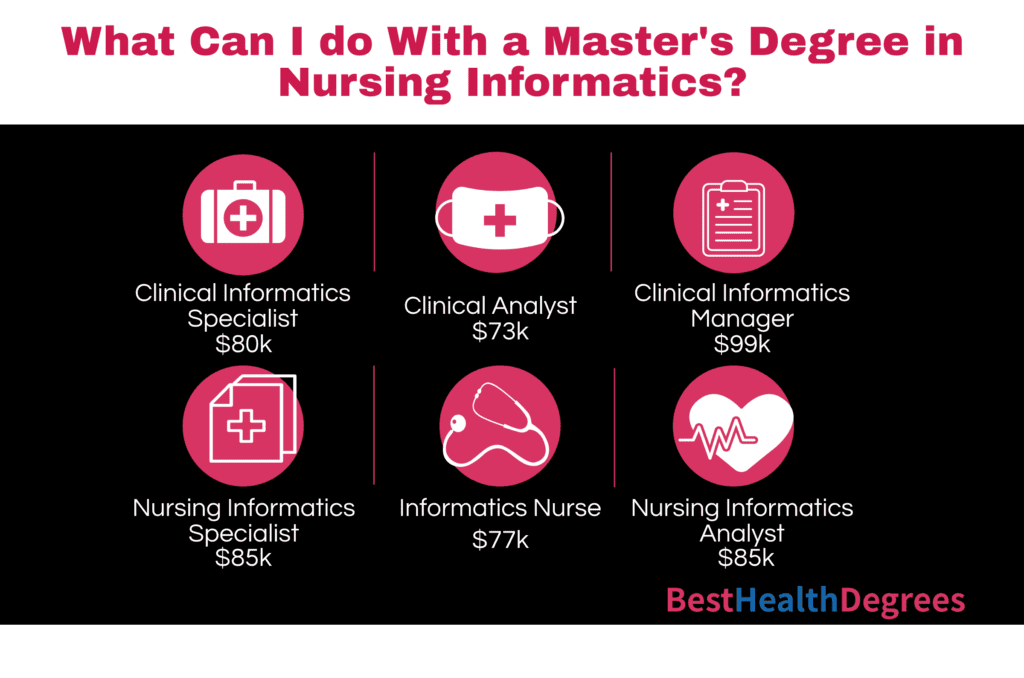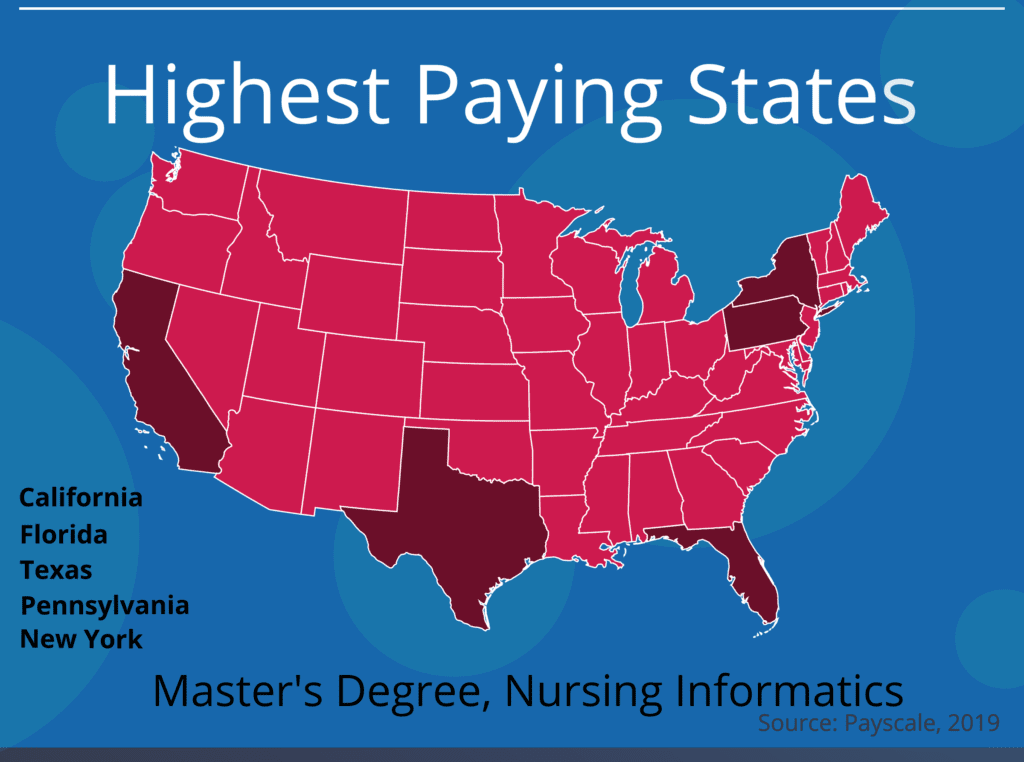Key Takeaways:
- Field Overview: Healthcare informatics uses data and technology to improve healthcare quality and efficiency.
- Specialization Differences: Nursing informatics is a subset focused on nursing, requiring a nursing background.
- Career Potential: Informatics is a rapidly growing field with diverse job opportunities in many healthcare settings.
- Education Requirements: Typically requires a master’s degree in Healthcare Informatics or related field, with certifications beneficial.
What is nursing informatics? What is health informatics? What is healthcare informatics? These all represent terms for the same category of information engineering. When trying to figure out what is nursing informatics or what is health informatics when applied to other disciplines outside of nursing, people can find the differing terms confusing.
However, in all cases, healthcare informatics represents the integration of scientific data and information technology to improve healthcare while also sometimes serving to lower the cost of healthcare. That is essentially the health or nursing informatics definition, and from that definition, it is possible to glimpse some of the benefits of nursing informatics.
What Is Healthcare Informatics?
Healthcare informatics really represents many disciplines that fall neatly under the healthcare informatics umbrella. So, when someone asks what is health informatics or what is healthcare informatics, they are really asking for the broad definition for what these terms mean.

Healthcare informatics professionals will usually deal with health and medical information. Because of that broad definition, an applicant can start to see just how nebulous and far-reaching this particular discipline can become.
Anything from electronic health records record-keeping to full IT administration can fall under the purview of healthcare informatics. Health informatics also deals with various sciences, which is important because the healthcare field includes a tremendous number of biological and physiological subcategories that intersect with even more categories, such as chemistry.
Is health informatics a good career choice? Yes, once there is an understanding of what is health informatics and why is it so important, it becomes quite clear this field is an excellent choice, especially right now. These facts also make pursuing a Masters in Healthcare Informatics worth it as well.
What Is Nursing Informatics?
The nursing informatics definition is not precisely the same as the one for health informatics. Nursing informatics represents just one of the specialties that come from the full healthcare informatics field. Still, nursing informatics can sometimes work a little different from other forms of healthcare informatics.
The nursing informatics specialty typically involves people already in the nursing field branching out to a nursing specialty, rather than a healthcare informatics specialty. This usually means that if an applicant is not already a nurse or on a trajectory towards becoming a nurse, then they cannot provide the benefits of nursing informatics to the nursing field.
This is why questioning how to become a nurse informatics professional is usually answered by, first become a nurse. By contrast the healthcare informatics path can start and finish strictly from an IT standpoint with a specialization in a healthcare field.
The nursing informatics field is growing, but for those that want to know how to become a nurse informatics professional, they must start with a passion for the kind of direct care that nurses provide. Nursing informatics strive to create better conditions, treatments, and levels of care for people, which answers the question of what is nursing informatics and why is it so important.
Health and nursing informatics among the specialties that are growing rapidly. The need for cost-effective healthcare drives the growth of these fields, and so does the need to move healthcare into the modern realm of rapid technological advancement. Healthcare can do none of these things without data, new processes, and the integration of information technology.
The health and nursing informatics definition can have subtle differences depending on where the information will apply, but there is no doubt these fields make a Masters in Health Informatics worth it and answers the questions of what is nursing informatics and why is it so important to modern healthcare.
What Are the Best Schools or Programs for Health and Nursing Informatics?
Choosing a school for health or nursing informatics follows the same considerations that come with choosing a school or program for any other degree. Whether an applicant is looking for a healthcare informatics program or a nursing informatics program, they must start by narrowing their choices to find the best schools or programs. The easiest way to quickly narrow the list is by looking for proper accreditation status.
Various types of accreditation exist, but the main accrediting groups for informatics programs will start with regional accreditation. When applying to a school, college, or university, an applicant should check that the school in question has a current accredited status from one of the six regional accrediting groups.
These groups grant accreditation to schools of higher education in their respective regions, hence the term. Regional accreditation means the school meets educational standards set by these groups with the full recognition of the US Dept. of Education and the Council for Higher Education Accreditation. Applicants should consider this type of accreditation a bare minimum in most cases.
Schools with regional accreditation tend to have an easier process for gaining financial aid or transferring credits between schools. Nevertheless, the regional accrediting groups tend to focus on schools as a whole, rather than on individual programs. So, while an applicant may find a good school, they must also look to national or specialized accreditation status for individual programs they would like to participate in.
National or specialized accreditation comes from accrediting groups who set criteria and standards for an educational program. These groups typically consist of professionals in the field and other who make important decisions about the discipline or industry.
It is possible to find a program that has full specialized accreditation without also having regional accreditation. This is usually okay, and not something an applicant should have concern over.
Keep in mind the regional accrediting groups usually only work with a facility as a whole, but some programs have no attachment to any particular university. Nevertheless, when it comes to health and nurse informatics, there are different accrediting groups to consider.

Who Accredits Health Informatics Programs?
When choosing a health Informatics program, the main accrediting group to look for is the Commission on Accreditation for Health Informatics and Information Management (CAHIIM). Another group, the American Medical Informatics Association (AMIA). However, the AMIA joined the CAHIIM in 2014, so applicants do not have to worry they will receive a different type of education if they see one group listed but not the other.
Who Accredits Nurse Informatics Programs?
Nursing informatics represent more of a nursing specialty, so accreditation for these programs can fall to groups that deal more with the nursing vertical of healthcare specifically. Some groups who accredit nurse informatics programs include:
- Accreditation Board for Specialty Nursing Certification
- American Nurses Credentialing Center (ANCC)
- American Association of Colleges of Nursing (AACN)
- Commission on Collegiate Nursing Education (CCNE)
- Accreditation Commission for Education in Nursing (ACEN)
- Accreditation Council for Continuing Medical Education (ACCME)
- Accreditation Council for Pharmacy Education (ACPE)
The CCNE and ACEN represent some of the most well-known accrediting groups, but their focus is the nursing industry overall, not just nurse Informatics programs. Sometimes a nursing Informatics program will have joint accreditation from several programs. When choosing a program, the more accreditations, the better. This will mean the program meets the educational requirements of several groups instead of just one.
Local and state accreditation groups can also exist for health and nursing informatics programs. Applicants who plan to work in a specific area should check for these types of accreditations as well.
What Are the Different Types of Healthcare Informatics Degrees?
Various types of healthcare informatics degrees exist. It is possible to tie informatics to any singular part of the healthcare system, and so there are numerous healthcare Informatics specialties. The best health informatics programs will help guide students towards the proper specialties that will help them meet their goals.
Applicants should understand that healthcare informatics is something of an umbrella term. This term stands in for a plethora of healthcare information management types and subtypes. For example, nursing informatics is a specialty of health informatics, and the nursing informatics degree requirements may contain some overall with other types of health Informatics program tracks.
The difference is, the education that determines nursing informatics degree requirements will have a strong focus on using information technology in service of the nursing profession specifically, as opposed to some other healthcare discipline.
Some other MS in health informatics degree types can include degrees with a focus on:
- Clinical informatics
- Biomedical informatics
- Nutritional or pharmaceutical informatics
- Public health informatics
- health care data analytics
- health information technology
- patient outcomes
- medical research
Other degree types also exist. In fact, each degree type also has subspecialties that can work in conjunction with the main degree type. For example, some of the best Health Informatics Masters programs can lead to a health informatics degree with a focus on biomedical informatics and a working knowledge of community health informatics. These things can work together depending on which career path health informatics graduates choose.
Many of the different health informatics master’s degree types only become available when a student chooses to pursue their Masters. At this point, the degrees go from generic, to highly specialized.
Are There Online Informatics Programs? How Do I Find the Best Online Healthcare Informatics Programs?
As a field that deals a lot with information technology and data, it makes sense that online programs would exist. Applicants can choose an online Master of Health Informatics degree program, or an online for any informatics specialty, such as with online Nursing Informatics MSN programs.
The best online health informatics programs and the best online nursing informatics programs will have all the elements of similar programs that exist in facilities or on campuses. All the same rules for choosing an online Master of Health Informatics program are the same.
Applicants must vet the programs and narrow them down by reputation, accreditation status, and the applicant’s own goals. Also, when seeking the best online Health Informatics Masters programs, applicants can often find programs offered by fully accredited colleges and universities.
Pursuing an online Master of Health Informatics degree can often come with benefits not available to traditional schools. Online degree programs in general tend to offer a lot more options that offer flexibility for students. This can come in particularly handy for those pursuing a Masters as people who seek graduate degrees often are already dealing with work and responsibilities.
So, when an applicant looks for an online Master of Health Informatics degree or want to find the best online nursing informatics programs, they can also seek online options that allow them to earn their degrees in a way that fits their schedule.
Does Healthcare Informatics or Nursing Informatics Require Certifications or Licenses?
Whether an applicant will require some type of certification or not will depend on the career path they choose in the healthcare informatics fields. In many cases, certification can become the needed step to move into an informatics specialty. Usually, certification of one type or another can help someone stand out in their respective field.
For example, the Healthcare Information and Management Systems Society (HIMSS) offers two professional certifications which can help show prove they have advanced knowledge of healthcare information and management systems to go along with their chose specialization.
Some programs offer graduate level certifications which can allow someone to add informatics to their repertoire if their degree is not already directly related to healthcare informational technology and systems. Nevertheless, certificate programs that are not backed by a related degree can often only lead to entry level healthcare informatics positions.
Some types of informatics certifications come with various requirements that have everything to do with the occupation someone engages in. For example, nursing informatics certification programs exist, but many nursing informatics certification programs are only available to those who already have or are pursing a nursing degree.
Applicants looking for nursing informatics certification will typically already have reached the level of RN. Even at the degree level, the nursing informatics specialty represents a nursing Masters degree. Someone who want so pursue a career in nursing informatics will usually start on the same path they would if they were pursuing a nursing degree.

What Are The Types of Careers Available In Health Informatics?
Healthcare informatics jobs and nursing informatics jobs exist in abundance in the healthcare industry. The health informatics careers available span the entirety of the healthcare field, which is a large one. Since healthcare informatics jobs are both healthcare and information technology jobs, the healthcare informatics job description is not one that is always the same. Some healthcare informatics jobs can include:
- Health information technologist
- Informatics nurse
- Healthcare IT
- Health informatics consultant
- Chief medical information officer
- Electronic medical records keeper
- health informatics consultants
- clinical informatics specialists
- health informatics director
- electronic health records systems manager
- health data project managers
- health data scientists
Depending on experience and degree level, every informatics or informatics-related job can also come with increasing job titles. A health information technologist can lead to a health information director. Nursing informatics jobs offer just as much versatility and growth as any other healthcare providers or informatics occupation.
Because of the nature of the informatics industry, it is also possible to go in non-traditional routes with the degree or certification. For example, nursing informatics jobs work from home opportunities. However, this can only work if the nursing informatics jobs work from home job descriptions indicate that an applicant will only handle data and entering that data into health information systems.
These represent some of the types of nursing informatics jobs entry level applicants can find. Entry level jobs in healthcare informatics, in general, will usually involve more number crunching and dealing with basic healthcare systems, such as billing, insurance, working with healthcare computer applications. This all means that career opportunities exist at every level of the healthcare informatics spectrum.
Some of the more in-demand careers in healthcare informatics include consultancy. A health informatics consultant can work independently and set their own salary in many cases. These individuals can help guide healthcare facilities in practical or efficient ways to set up their networks, train teams, help with monitoring, and other duties that come with the networking and IT side of healthcare.
Nursing informatics is also popular at the moment. Nursing involves direct patient care, and finding ways to make that care more efficient and effective is something that many healthcare businesses seek out. Nursing Informatics specialists can create policies, deal with technical logistics, improve record-keeping, and train other nurses.
What Are the Salary Expectations in Health and Nursing Informatics?
Potential salaries for health or nursing informatics can vary widely. The field is a growing one and demand for informatics specialists continues to grow. Still, health informatics salaries and nursing informatics salary can depend on plenty of variables. The occupations and careers can vary greatly by name, so there are far too many salary ranges to look at.
Applicants should do some research to see which types of health informatics salary do best in the areas where they hope to work. Variables can include things like the specialization types, what is in demand in any area, and who is doing the hiring. Most of the same rules apply when it comes to education and experience when looking at healthcare informatics salary.
Masters in Nursing Informatics salary will almost always rise above nursing informatics salary that comes from just a certification or a lesser degree. Someone with experience in the healthcare field in any capacity will likely have a better chance to demand a higher healthcare informatics salary than someone who lacks experience.
By looking at the salary averages for just health informatics specialists, it can help show where someone might find themselves when it comes to base level salary ranges across the nation. According to Glassdoor, the average base pay for health informatics specialists is around $43.7k. PayScale lists the average as $63.2k. The disparity comes from how these sites count informatics jobs.
Glassdoor shows on the same page that some companies average a far higher pay for health informatics specialists, and even higher for those with titles like health informatics analyst ($100k+). This should all go to show that there are incredible variables in health informatics salaries that all have to do with how an applicant presents their specialty, which career path they choose, and which business they work with.
A healthcare informatics Masters degree salary, and MSN Informatics salary, and masters in nursing informatics salary expectations can also increase based on differing criteria. Other nursing informatics jobs salary can reflect the average salary of a nurse rather than the average salary of a health informatics specialist.
Since most nursing informatics specialists will also have a nursing degree, they can expect the informatics certification to give them a higher nursing informatics salary just as any other nursing specialization would. This can also apply to people in certain fields already.
For example, someone in IT how also earns their health informatics degree or certification on top of their IT degree can usually find far higher health informatics salaries simply because they are specializing within a narrower field. In this way, a healthcare informatics salary or a healthcare informatics Masters degree salary can only boost the salary opportunities already available for that field.
Applicants should spend some time looking at the different salary possibilities by also looking at all the different occupations available through healthcare informatics certificates and degrees. No one should assume that anything is set in stone when it comes to these types of careers.
As previously shown, salaries for health informatics can vary by tens of thousands of dollars based on the name of the position and the company that is looking for the healthcare informatics specialist.

Are There Any Professional Organizations for Health or Nursing Informatics?
Professional organizations offer people opportunities to network, learn, find opportunities, and stay abreast of news and changes in their fields. The networking opportunities alone are typically a good enough reason to join a professional organization.
These groups typically include those who work in, make policy for, or govern many aspects of a field whether it is at the local, state, or national level. In addition, professional organizations tend to have resources that are not available elsewhere, as well as paths towards professional development.
Opportunities typically start in these organizations, and some of these organizations contain the people who create those opportunities. Applicants should certainly consider it a good idea to join one or more of these organizations and take advantage of everything they have to offer.
For health and nursing informatics professionals, many of these organizations exist. Some top professional organizations in this field include:
- International Medical Informatics Association (IMIA)
- American Health Information Management Association (AHIMA)
- Healthcare Information and Management Systems Society (HIMSS)
- American Medical Informatics Association (AMIA)
- American Nursing Informatics Association (ANIA)
Other healthcare organizations also count, which are too numerous to count. Applicants should start looking into professional organizations as early as possible and remain with the ones that offer them the most benefit as they move forward with their careers.
Related Rankings:
- 15 Best Master’s in Nursing and Healthcare Informatics
- 25 Online Master’s in Nursing and Healthcare Informatics
- 10 Most Affordable Online Master’s in Nursing and Healthcare Informatics
- 10 Fastest Online Master’s in Nursing and Healthcare Informatics
- Top 10 Best Colleges for a Bachelor’s Degree in Health Informatics
- 10 Fastest Online RHIT Programs